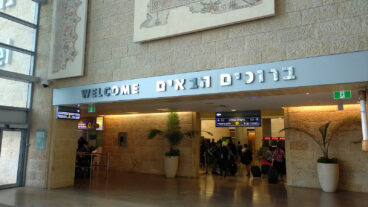For a revival language with only a small amount of words in comparison to Romance languages or English, Hebrew certainly has its fair share of street slang. Witnessing a conversation between two friends on the street feels like a game of verbal ping-pong made up of colloquial phrases and at least a few informal jabs and niceties.
For instance, you may notice that Israelis have a small-talk ritual, asking each other “How are you?” and “What’s up?” in a few different forms before delving into deeper conversation.
When learning Israeli slang, you’ve got to understand the main categories: Arabic phrases ingrained into the Israeli vernacular; words that just don’t translate into English or imply something completely different than their literal meaning; riddle-like phrases based in superstition; non-verbal utterances; the many phrases to say “awesome,” and so on.
Welcome to Israel. Now let’s learn some slang!
BORROWED FROM ARABIC
We’ll start off with the easiest, most go-to Hebrew slang terms, which aren’t actually Hebrew at all, but borrowed Arabic words that have snuck their way into mainstream Hebrew. Even a novice can, and should, make good use of these words and phrases right off the plane.
Halas! (“Enough!”)
Not to be confused with the Hebrew equivalent, die!, which comes off a bit harsher to the English-speaker’s ear (hmm, we’re not sure why).
Sababa (“cool/awesome”)
“Do you want to go grab a coffee? Ken [yes], sababa!”
Bonus phrase: Sababa l’gamrei (totally awesome)
Yalla (“Let’s go,” literally “C’mon, mess!”)
Bonus phrases: Yalla bye, used as an exit to a phone conversation; Yalla balagan, used to hype someone up for a party or crazy stunt.
Walla (“Wow”)
“Did you hear that so-and-so moved to Argentina?” “Walla!”
Achla (“Great”)
“How is that cake I baked you?” “Achla!”
Achla bachla is a cutesy way of saying achla, usually used with children, similar to its Hebrew counterpart, Yofi tofi.
Habibi/Habibti (My dear)
Used when conversing with close friends or family.
Fadicha (snafu or mess-up)
“I made a big fadicha today; I mixed up two important dates at work.”
Mapsoot/it (to be happy with something)
“He’s mapsoot with his new hairdo. He really likes it.”
L’Allah (“very,” literally “To God”)
“That’s beautiful l’Allah.”
Alek (“Yeah, right”)
Said in response to a claim that is viewed as unfounded.
“I’m the world’s best tennis player.” “Alek world’s best, you’re not even the best in the city!”
PHRASES THAT JUST DON’T TRANSLATE
Holeh/met alecha (“I’m sick about you”/”I die for you”)
Don’t worry, it actually means they like you a lot.
B’shum panim v’ofen lo (something that you must never do, literally “in no face and way”)
Yesh! (“Yes!” Literally “there is”)
Used in celebration, or to show excitement about the prospect of something.
Mah pitom (No way! Literally “What suddenly?”)
Used in strong rejection of an accusation or absurd question.
“Do you sit around and eat rugelach all day?” “Mah pitom! Of course not!”
Kol hakavod (“Good job,” literally “all the honor”)
Pa’am shlishit, glida (“Third time, ice cream”)
What you say when you run into someone you know unexpectedly more than once within a short period of time. Fate has brought you together, so you might as well go catch up over some ice cream.
Lo mashu: (“not great,” literally “not anything”)
“How was that new movie you saw?” “Lo mashu.”
B’chaiyecha/B’chaiyechem (“Oh, c’mon!” Literally “In your life”)
“You can’t make it to work on time at least once a week? B’chaiyechem!”
Davka
Used to emphasize something specific or bring up a point in spite of something.
“You’re blaming me for that?” “Davka, yes.”
Tachles (“bottom line” or “totally”)
Used to get to the root of what someone wants, or agree with a point that you previously hadn’t considered.
“Tachles, what would you like to get out of the deal?”
Ayn matzav (“No way!” Literally “There is no situation”)
“Are you going to work over the holiday break?” “Ayn matzav!”
Bonus phrase: “Ayn matzav, achi” (“No way, brother”)
Ayn li musag (“I have no idea.” Literally “I don’t have a concept”)
Melech (a man who does whatever he feels like doing, regardless of what anyone else thinks. Literally “king”)
Gadol alai (“It’s too much responsibility, or too hard to handle.” Literally “Big on me”)
Hazui (Something strange or unbelievable, literally a wild fantasy or delusion)
Nu? (“So?”)
Said when someone forgets to finish their sentence or thought, to provoke a continuation.
Bonus phrase: Nu b’emet (“Oh, c’mon!” Literally, “So, in truth”)
Stam (“Just because” and also “Just kidding”)
Hopa!
No, we’re not about to smash some plates and dance like Greek Zorbas. In Israel, hopa is called out enthusiastically for lots of different reasons from “aha!” moments to “oops, you tripped!” moments to any other moments of surprise.
Yo (utterance of disbelief)
Usually followed by “Ani lo ma’amin!” (“I don’t believe it!”)
Imaleh! (An expression of being frightened or startled. Literally “Mommy!”)
Mikubal (socially or culturally acceptable)
“You can wear flip-flops to the wedding. It’s mikubal.”
Hiyush/biyush (A cutesy way of saying “hi” or “bye”)
Combina (A special arrangement set up by someone in the know/on the inside, to secure a favor)
SUPERSTITIOUS SLANG
Tfu tfu tfu (The sound of theoretical spitting, equivalent to “Knock on wood”)
Bli ayin hara (“Not to jinx it or anything.” Literally “Without the evil eye”)
Baruch HaShem (“Blessed is God”)
Used as a response to any question, from “How are you?” to “How is your new job going?” It means “Everything is okay, thank God.”
Chas V’chalila or chas v’shalom (“God forbid!”)
B’ezrat HaShem (“With the help of God”)
Used as a response to a question of fate.
“Are you planning to go to the soccer game?” “B’ezrat HaShem!”
B’Sha’a tova (“In a good hour”)
A superstitious response to news of something that is not yet stable or come to full fruition. This is the proper response to someone’s announcement of a pregnancy, new job or venture.
Kaparah alecha/alaich (“My darling.” Literally “Repentance on you,” having to do with the evil eye)
NON VERBAL UTTERANCES
Pssssh! (“Wow/amazing!”)
Used when someone is in awe of a great achievement.
“Oof” (“Oops”)
Not to be confused with “Oof mi’po!” (“Get out of here!”)
Oo-wah! (A sound made in solidarity, upon hearing about someone else’s troubles/bad day/unpleasant story)
Another term of the same meaning: “why, why”
Ichsah (an expression of disgust)
“Ichsah, you touched the trash?”
ACRONYMS and ABBREVIATIONS
Sofash (Short for “sof shavua,” weekend)
Motzash (short for “the end of Shabbat,” i.e. Saturday evening)
“The store is closed on Saturday, but opens back up on motzash.”
Hamshush (a term combining “weekend” and “Thursday,” meaning a long weekend)
“I’m taking a hamshush for the holiday weekend. See you next week!”
Dash (short for “drishat shalom,” ”Send my regards”)
“Dash to your parents!” (Not to be confused with Daesh, the Arabic name for the terrorist group ISIS.) Bonus phrase: Dash cham (“warm regards”)
Chool (“abroad,” literally “outside the land [of Israel]”)
“I’m flying to chool tomorrow. I’ll be back in two weeks.”
Looz (a personal calendar or schedule, literally “board of times”)
EVERYTHING IS AWESOME!
Use any of these expressions to say “awesome!”
Gadol/Anak (“big”/“gigantic”)
Chaval al hazman/Chaval lcha al hazman (“A waste of (your) time”)
Pitzutz (“explosion”)
Sof haderech (“The end of the way”)
Hakol d’vash (“Everything is honey”)
Aish (“fire”)
Sababa (see above)
REPEATING WORDS AND RHYMES
Mashu mashu: (“Something something”)
Used to describe something that is especially great. (“Mashu” can describe something extraordinary but not as great as “mashu mashu.”)
Shalom shalom (a cutesy way of saying hello to friends or family.)
Yofi tofi (see above)
Hachi achi (Something that is the best, literally “The most, my brother”)
“Those strawberries are hachi achi!”
Sof sof (“finally,” literally “end, end”)
THINGS STRANGERS WILL TELL/ASK YOU IN PUBLIC
Titchadesh (“Be renewed”)
Said by the salesperson when you buy something in a store, or when someone sees you have a new hairdo or outfit.
Betayavone (“Bon appetit”)
Said by anyone who sees you eating in public, whether they know you or not.
Take-away (Food ordered to go, strangely said in English)
Labriut (“To the health”)
A response to your thanking someone for a meal whether in a person’s home or at a restaurant, or a term said in response to an “apchi”(sneeze).

















